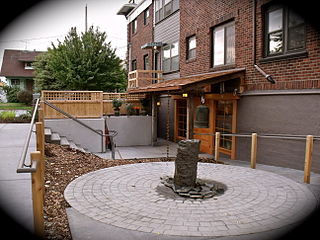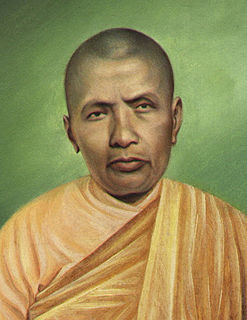Dharmachari Aryadaka (1948–2003), born as Philip Miller in Seattle, Washington, was best known for being the first Buddhist chaplain in Washington state prisons.

A chaplain is, traditionally, a cleric, or a lay representative of a religious tradition, attached to a secular institution such as a hospital, prison, military unit, school, labor union, business, police department, fire department, university, or private chapel.
Escaping the draft, Aryadaka traveled the world; he went to India, Nepal, the Himalayas, Morocco, and Afghanistan. He converted to Buddhism in his twenties, during his imprisonment in 1974 for 22 months in Finland on a drug charge, when he joined the Friends of the Western Buddhist Order, now the Triratna Buddhist Community. He discovered Buddhism out of his prison experience, when he "took meditation seriously and found dharma in his cell". [1] He returned to the US 1981, and began teaching meditation in his home, and started a family in 1984. [2]

Conscription, sometimes called the draft, is the compulsory enlistment of people in a national service, most often a military service. Conscription dates back to antiquity and continues in some countries to the present day under various names. The modern system of near-universal national conscription for young men dates to the French Revolution in the 1790s, where it became the basis of a very large and powerful military. Most European nations later copied the system in peacetime, so that men at a certain age would serve 1–8 years on active duty and then transfer to the reserve force.

India, also known as the Republic of India, is a country in South Asia. It is the seventh largest country by area and with more than 1.3 billion people, it is the second most populous country as well as the most populous democracy in the world. Bounded by the Indian Ocean on the south, the Arabian Sea on the southwest, and the Bay of Bengal on the southeast, it shares land borders with Pakistan to the west; China, Nepal, and Bhutan to the northeast; and Bangladesh and Myanmar to the east. In the Indian Ocean, India is in the vicinity of Sri Lanka and the Maldives, while its Andaman and Nicobar Islands share a maritime border with Thailand and Indonesia.

Nepal, officially the Federal Democratic Republic of Nepal, is a landlocked country in South Asia. It is located mainly in the Himalayas but also includes parts of the Indo-Gangetic Plain. With an estimated population of 26.4 million, it is 48th largest country by population and 93rd largest country by area. It borders China in the north and India in the south, east, and west while Bangladesh is located within only 27 km (17 mi) of its southeastern tip and Bhutan is separated from it by the Indian state of Sikkim. Nepal has a diverse geography, including fertile plains, subalpine forested hills, and eight of the world's ten tallest mountains, including Mount Everest, the highest point on Earth. Kathmandu is the nation's capital and largest city. Nepal is a multiethnic nation with Nepali as the official language.
Aryadaka was ordained as a member of the FWBO in 1984, and was given his name by the order after a three-month retreat in Italy. It means "noble sky-goer" and was given to him because he "embodied lofty and spiritual ideals". [1] While working as a land surveyor, welder, and sculpturist, Aryadaka built up the Western Buddhist Order in Seattle, co-founded the Seattle Buddhist Center on Beacon Hill, and worked with prisoners. He also worked as a volunteer and liaison between prisoners and their families. He was appointed to Washington's Religious Advisory Committee in 1998 and became the state's first paid Buddhist prison chaplain in 2000, illustrating a shift in how prison ministries reached out to less traditional religious traditions. [2]

The meaning of a spiritual retreat can be different for different religious communities. Spiritual retreats are an integral part of many Hindu, Buddhist, Christian and Sufi (Islamic) communities.

Surveying or land surveying is the technique, profession, and science of determining the terrestrial or three-dimensional positions of points and the distances and angles between them. A land surveying professional is called a land surveyor. These points are usually on the surface of the Earth, and they are often used to establish maps and boundaries for ownership, locations, such as building corners or the surface location of subsurface features, or other purposes required by government or civil law, such as property sales.

A welder or lit operator is a tradesperson who specializes in fusing materials together. The term welder refers to the operator, the machine is referred to as the welding power supply. The materials to be joined can be metals or varieties of plastic or polymer. Welders typically have to have good dexterity and attention to detail, as well as technical knowledge about the materials being joined and best practices in the field.
Aryadaka died in 2003 at the age of 55 from liver disease caused by the hepatitis C virus. He had a liver transplant four years earlier.

The liver, an organ only found in vertebrates, detoxifies various metabolites, synthesizes proteins, and produces biochemicals necessary for digestion. In humans, it is located in the right upper quadrant of the abdomen, below the diaphragm. Its other roles in metabolism include the regulation of glycogen storage, decomposition of red blood cells and the production of hormones.

Hepatitis C is an infectious disease caused by the hepatitis C virus (HCV) that primarily affects the liver. During the initial infection people often have mild or no symptoms. Occasionally a fever, dark urine, abdominal pain, and yellow tinged skin occurs. The virus persists in the liver in about 75% to 85% of those initially infected. Early on chronic infection typically has no symptoms. Over many years however, it often leads to liver disease and occasionally cirrhosis. In some cases, those with cirrhosis will develop serious complications such as liver failure, liver cancer, or dilated blood vessels in the esophagus and stomach.











